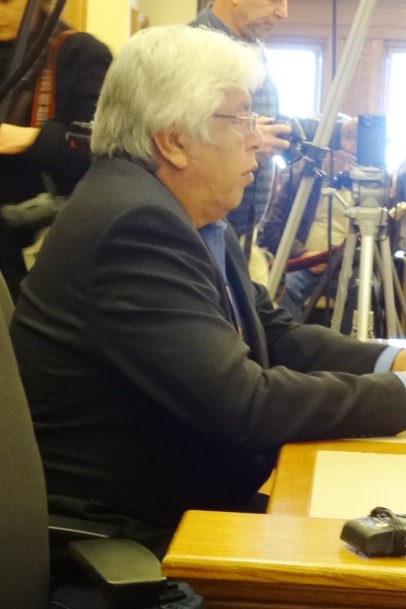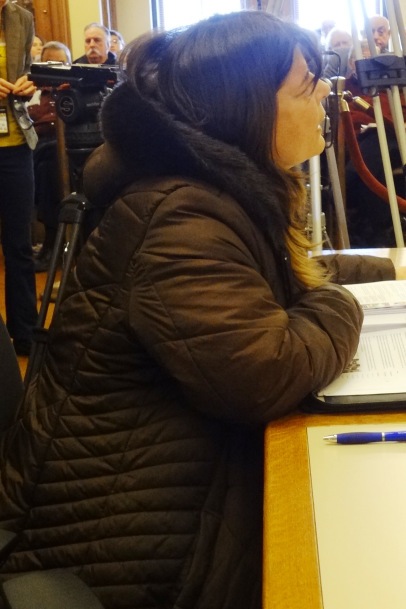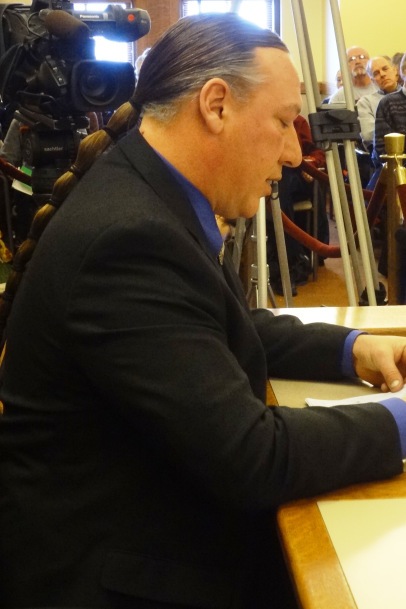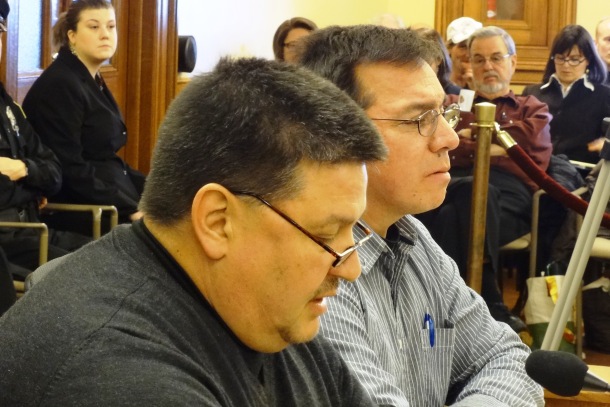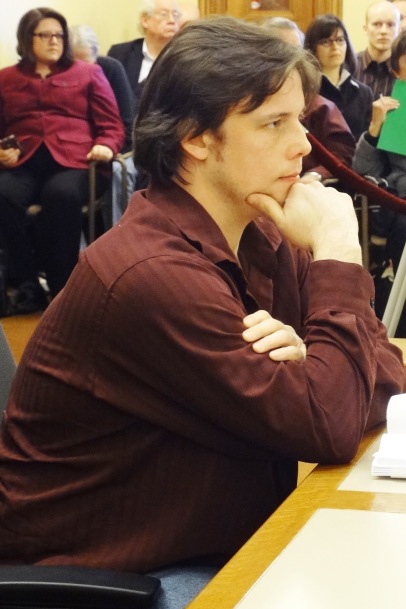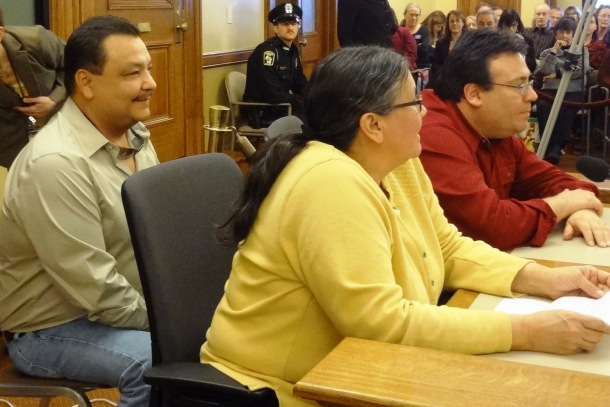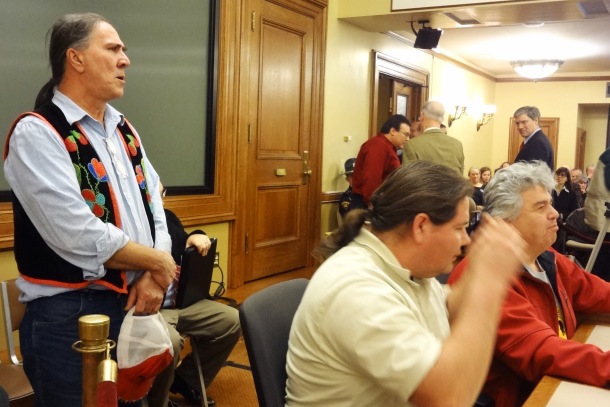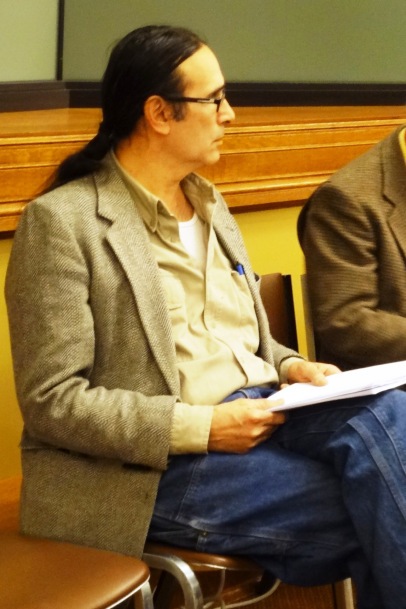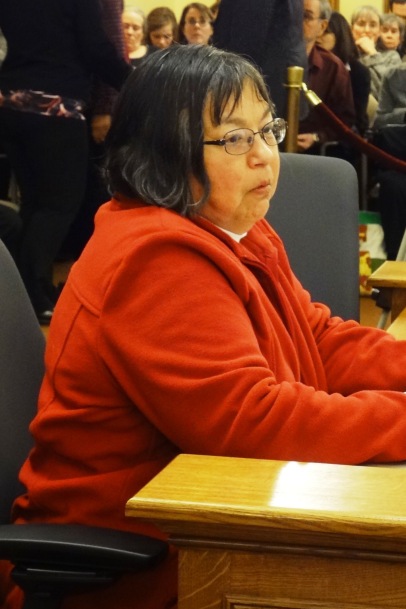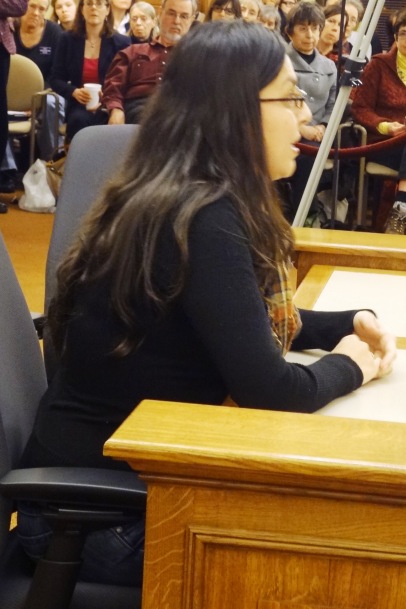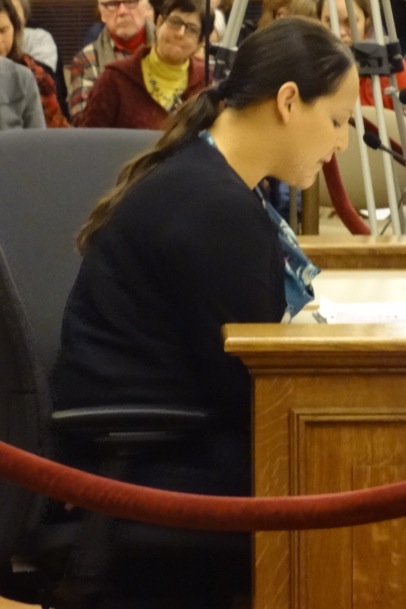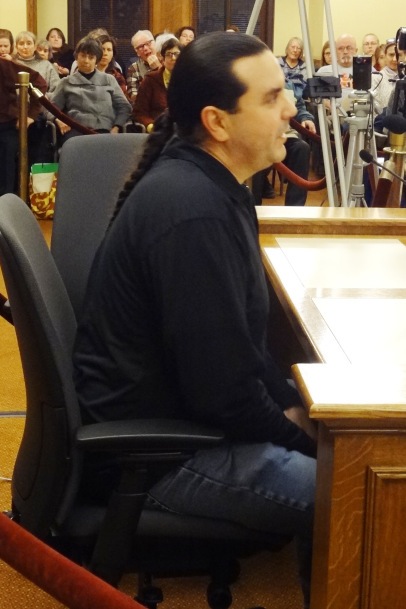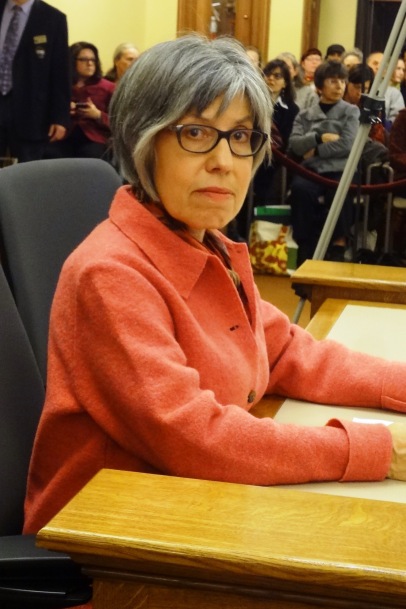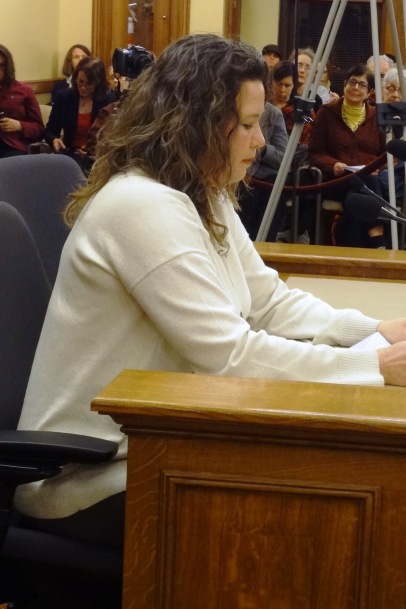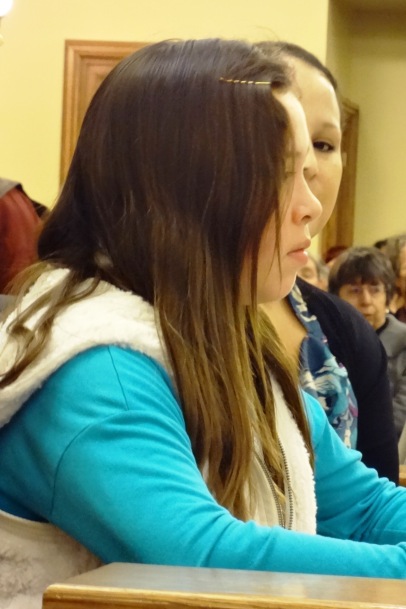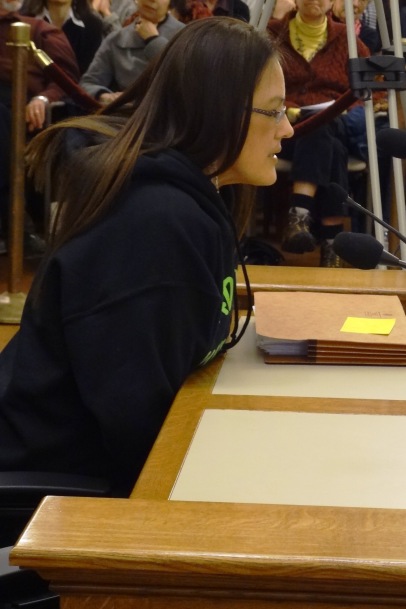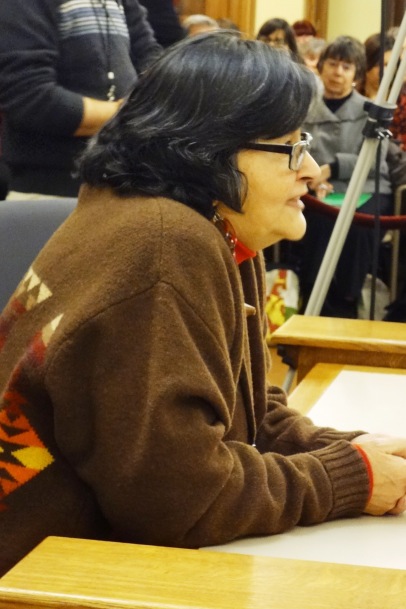Read this article on line Back
Wisconsin Tribal Members Speak Out on Mining Bill
January 25, 2013 by Rebecca Kemble
On Wednesday, January 23, 2013 a joint hearing of the Wisconsin State Senate and Assembly mining committees was held in Madison as the one and only opportunity for the public to weigh in on a controversial mining bill being rushed through the legislature. The hearing was announced just four days prior, causing hundreds of people from the northern part of the state where a catastrophic open pit iron mine is being proposed to scramble to make arrangements to make the 5 to 6 hour trip downstate.
Members of the Bad River, Red Cliff, La Courte Oreilles and Lac du Flambeau bands of Lake Superior Chippewa as well as Ho Chunk and Menominee tribal members made the journey. What follows is exerpts from their testimonies.
Robert Mann, Ho Chunk.
“I’ve come here today to speak a little bit about our culture. I’ve been hearing two sides to this story. I want to talk to you from my heart. The land is very important to all of us. We need to take care of her. In our culture we call her our grandmother. Sometimes with progress today we do things to abuse her. The earth does not belong to man, man belongs to the earth. These things were taught to me by my father, grandfather and elder relatives.”
Betty Kerr
“I’m Betty Kerr, and I’m here on behalf of my grandson Victor Nevela and my children who are Red Cliff members. On behalf of father who passed away. We need a moratorium on mining the Penokee Range. You have factual evidence that proves that this area is not mineable. Why didn’t they mine it in the 1950s? Because they knew there was pyrite there. Just like Joseph Skulan’s testimony last year showed. Like Senator Frank Lasee said about a wind farm, “It’s not fair to put something so noisy and so large so close to people, unless you can be sure it’s safe.” This bill is written by the guy who wants to mine it.”
Michael Isham, La Courte Oreilles and Chairman of the Great Lakes Indian Fish and Wildlife Commission Board.
“Normally I’d begin by thanking everyone for the opportunity to speak here today, but I’m having a hard time doing that. Had to reshuffle my schedule at significant expense to get down here. Thinking about the elk, pine marten and our brother the wolf that continues to roam the area again. Then I see the mine tailings piles, mining bust towns. The Ladysmith jobs claims were a farce.
“Future generations will pay for jobs now with environmental degradation. Look at the cancer rates, autism rates and disabilities from the areas where there is taconite mining.
“The Penokees aren’t “almost” sacred, it IS sacred…
“The state does not have the ability to legislate treaty rights away. The wild rice is sacred, and that’s why the reservation is there. I don’t know of any wild rice left downstream of these mining sites in Minnesota. This would be completely devastating. Has DNR and Army Corps of Engineers consulted with the tribes as is required by executive order?
“I can’t harvest a fish south of Ladysmith according to my treaty rights. Our harvest is a sustenance harvest, and we can’t harvest there because any amount of pollution bio-accumulates in us.”
Brooks Bigjohn and Eric Chapman, Sr. Lac Du Flambeau Ojibwe.
Bigjohn: “When I sit here and listen to words like reclamation, exemptions, etc. I feel like we’re walking down that same trail of broken promises. The holes are drilled. 5.5 million tons of dynamite ready to go pop. Gonna blow up those mountains in the Penokees. If it’s allowed every nine days it’s going to be equal to a Hiroshima. If you do that three times a month, that’s allowing three Hiroshimas happening a month in the Penokee Hills. I’m concerned about the air.
“We are not going to stand by and let that happen without a fight. We don’t fight with hands and bows and arrows. We fight with words in the courts and we will litigate this to no end. There’s laws that protect what Indian people have up there. We’re going to fight until the end.”
“Have you guys ever heard about the Native American Graves and Repatriation Act? Do you know that our water quality standards are stricter than state standards? Jobs? Yes. We are the biggest employers in the area. We’ve heard all these reports! Let’s not be naïve, let’s not get schnookered, like we say back home.”
Chapman: “Any business that wants to do business in Indian country in WI must develop in a safe and environmentally sustainable way.”
Mark Gokee, Red Cliff
“The six hour drive and short notice, thanks a lot for that. First nations in Canada are under assault like we are here. All Ojibwe tribes are signatories to treaties. We reserved the rights – they were not given, they were reserved. As legislators you do have an obligation to meet those treaty rights we do have. I see the Lawrence University study is being taken lightly, but these people are geophysicists.
“As far as the overburdens are concerned, those are poisons and directly affect our rights to harvest our rice, to fish and hunt and make use of the territory. Unfortunate how this whole thing has shaken out. Where’s Senator Jauch? It seems like the expedition of this hearing kept him out of it.
“I’m a Red Cliff tribal member. Our treaty rights extend way south of there. My nephew is a Bad River member. I’m sure his father would like to take him hunting, trapping, fishing and a project like this would severely curtail those rights.”
Bad River Ojibwe Chairman Mike Wiggins, Jr. and Council members Frank Connors and Reann Maday.
Maday: “I represent my people just like you represent yours. So many flaws in this bill that I don’t see how you can pass it. Only 2 minutes to try to get across to you how important this area is to us. I too drove here 6 hours. I too went that same distance and I too am worried about my children and grandchildren. What are they going to eat and drink when all of this leeching takes place? Water always goes down, it doesn’t go up. Be careful when you consider this bill consider the people who have to live there for the next 50 years. What are you going to tell you children – that you passed that bill that destroyed the Northlands?”
Connors: “The site in question is exactly the location where our water comes from. You talk about the miner on the 1848 flag of Wisconsin – 1,000 years before that there was a picture of me. Don’t open the doors to the destruction of my home.”
Wiggins: “The bill you’re looking at is set to violate treaties our tribe has entered into with you as representatives of the state of Wisconsin. It’s simple: the destruction of treaty resources through the destruction of habitat. The fact is, I could talk to you about the white collared fathers, but then I would have to talk about the silence after homily, then I would have to talk to you about the silence of Caroline Lake
“I look at all of you, and you’re 75% water, probably Madison Municipal water supply. We are 75% water from aquifers deeper than 1,000 feet that you’re not holding GTac accountable for. Because we’re directly downstream and set to endure the impacts of this project, we view this as an imminent threat. We view this as an act of genocide.
“What you have in your legislation is designed to obscure the examination of data that it would take to come to that conclusion that a mining operation would or would not be safe. You have perks built in there to make sure they can keep that information under wraps. You heard that from a professional just now.
“Right now that doesn’t exist and that’s not what is taking place here. Misinformation is being accepted and perpetuated as fact. Montreal tailings – that is an intert rock far different than the Tyler Formation. This notion of trucking the overburden out as gravel is pure fantasy. The munitions alone that it will take to blast that rock will itself toxify that rock. That toxicity goes way beyond the sulfuric acid toxicity you’ve already heard about.
“When you look at the obliteration of the headwaters of our homeland – our waters – there has been exclusion. Any consultation on this would amount to estate planning – the execution of our will.
“I’ve never talked to the company. I had a brief conversation with Matt Fifield a long time ago. If I were to sit down with Bill Williams, I’d ask him to bring his 250 core samples, and I’d ask him why he never drilled any exploratory boreholes that you guys permitted him for. This is a shell game represented in that language that changes “will do no harm” to “not likely to do any harm.”
“Reclamation not possible. Has there ever been a mine that has been shut down because of the health impacts on the community? I don’t think so. This is genocide, fellas.”
“USGS will show you that the ground water from Penokee Mountains are on a 50 year recharge cycle. The notion of 20 years is unbelievable. It represents a language chasm. “Engineering way out of problems.” I look at those manmade constructs, even the most beautiful fantasies of containing 434 million cubic yards of sulfide materials.
“What do you mean reclaim when the original rock is pulverized into fine powder? The obliteration of the headwaters of the Bad River is forever.”
Red Cliff members Marvin DeFoe, George Newago and Brian Bainbridge.
Newago: “I’m a blanket-ass Indian from northern WI. I’m here for my children. I listened to that woman cry about her husband leaving because there’s no jobs. Are you going to recreate history again? IN 30 years her grandbabies are going to be crying. What I do need is water. I don’t need to do anything else.”
Bainbridge: “I wouldn’t want to have what you’re about to do on my conscience.”
DeFoe: “I’m one of 9 council members. I’m here representing our tribe 6,000 members– 153 bands that surround the great lakes. I’m here representing the fish, trees, land and ancestors who have been upon our land since the ice age. I grew up in our area, played on the sand on the beaches. You can see the mistakes from the mining of the area.
“Our heart, soul and spirit depends on that lake. What’s really important is the mindset going on here. What’s going on in WI is the tip of the iceberg of what’s going on in this country. We’re asking you to be considerate of the next generations.”
Paul DeMain, La Courte Oreilles Mining Impact Committee.
“La Courte Oreilles Chairman Gordon Thayer sent a statement. LCO has taken the position that they are against the mine and therefore against the legislation. There is a consensus of our people that there will be no mine in the Penokees because it is an inappropriate place to place a mine.
“I’d rather see this committee figure out a way to fix the problems with the Milwaukee sewage district. The earth had a chance to heal itself up there, that’s why our land is pristine. I’d rather see this body put some thought into the fact that maybe 1,000 years from now that deposit will be worth hundreds of times worth its value. But the Bad River has to be willing to take the risk for good purposes, not for Chris Cline and his profits.”
Mary Lou Salawater, Bad River.
“Last night I was wondering, what does this bill mean to you? Is this just another piece of legislation you want to get through? We’re not just a bunch of whiners. This threatens our way of life. This legislation hangs over our heads day in and day out as a threat created by the very people sent to Madison to make life better for all Wisconsinites.”
Gloria Rodriguez, Bad River.
“Two minutes to plead for my life is not enough. You are putting a price on our heads. If you’re not honoring treaties, then you should give back the land. Enough is enough, we will idle no more and stay united.
“We do not want your money or your empty promises. You will all learn that you cannot eat money. If this mine is allowed, what are we going to live on? We’ve kept our land pristine. That’s all we want for the rest of you guys. Why are you going to destroy something that we need, that is important not just for my child but for everyone.
“Go find somewhere else to mine. We didn’t give you that land for you to come and destroy it. We didn’t lease it to you. If we knew what was going to happen, we would never, ever have leased that land.
“It seems that you ask more questions of the people who support the mine, but for those of us who oppose it you just say, OK. Jobs are definitely needed up there. We need different, more sustainable solutions. There are other things that would use the resources on our land. Have to think smarter than using someone’s money and destroying someone’s life.”
Beatrice Bender, Bad River
“Having grown up on the Bad River rez I understand the need for jobs. It wasn’t until I left that I realized the natural beauty. We live off the land. Deer, fish, apples, wild rice fill our cupboards and we are surrounded by family and friends.
“The glimpse of jobs is not worth our air and water quality. Our people deserve jobs that last and businesses that are invested in our community and that respect our assets. How can you consider employment that threatens the health of the worker and the everyday citizen? Who will feed the people of northern Wisconsin when the food is no longer edible? What will you do if this mine hurts my child or that of my neighbors? Look at alternatives that increase jobs and opportunities in northern Wisconsin.”
John Patrick, Bad River.
“Mining is obsolete. Resource extraction is obsolete. Hard to understand why this committee isn’t fighting for future progress in environmentally sustainable practice.”
Allie Raven, Bad River.
“I expect better from you, our legislators. As public servants you have a sacred responsibility to protect our health and welfare. For too long you have treated us as 2nd class citizens and considered expendable the lands and waters we depend on. For too long you have ignored our calls for help for job creation. Hope and desperation have blinded our neighbors to the fact that this has no short term job creation prospects.
“Strip mining is a lazy legislative answer. Wasting time and energy on a catastrophic mining bill is irresponsible. Is beating this dead horse the best you can do to help us? I hope not. If you are serious, let’s see some fresh ideas. Come up and work with us. Act decisively to restore our faith in you and the legislative process.
“We’re in a new economy, why are we talking about mining? This is the 21st century and you are supposed to be leading the way here. We’re not talking about big lakes, we’re talking about our water supply that can’t be traded off. I expect you will come up and work with us because I know you want to do the right thing. Let’s work together.
“I’d like to talk about the tour this weekend – that’s a bad idea because most people you want to talk to are planning to be in Madison.”One thing this project has given us is a very organized community.”
Luann Wiggins, Bad River.
“Unseen differences that make water take a different path. It’s easier to beg for forgiveness than seek permission first. This bill makes it easier for the company to beg for forgiveness. May god be with you as you make this decision.”
Madelyn Wiggins, Bad River.
“I love Wisconsin and Bad River. The mine kills. Like cutting down a tree to grab a leaf, or like my uncle says, lopping off your hand to clean a fingernail. If only everybody could see that money isn’t the only thing we need in life. We need fresh air and water.”
Jill Hartliv, Bad River.
“I brought with me 157 certified petitions from community members and 180 letters. Our land, community, spiritual ways – I should do whatever I can to protect the air, water and surroundings. Not only for future generations, but I think of the decisions of past generations. I feel like one of the wealthiest people on earth because of our pristine environment.”
Diana Miller, Menominee.
“Mining does not create jobs. It creates wealth for the companies that own them. You want to destroy the home of my brothers and sisters – the birds, the trees, the animals. They have nobody to speak for them. Very few people have spoken for our sisters and brothers who live in the Penokee Hills. I speak for them and the future generations that will be coming. My real eyes realize the real lies that mining companies are putting out there because they don’t care about what they’re gonna do to our sisters and brothers or our mother earth. They only care about the wealth they are going to create.”

